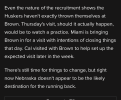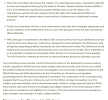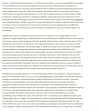Install the app
How to install the app on iOS
Follow along with the video below to see how to install our site as a web app on your home screen.
Note: This feature may not be available in some browsers.
-
Welcome to The Platinum Board! We are a Nebraska Cornhuskers news source and community. Please click "Log In" or "Register" above to gain access to the forums.
You are using an out of date browser. It may not display this or other websites correctly.
You should upgrade or use an alternative browser.
You should upgrade or use an alternative browser.
2024-25 Portal SZN Thread
- Thread starter Fargo Husker
- Start date
I have to admit that the offseason for CFB has become a lot more entertaining. In a watching a trainwreck is entertaining kind of way.
First NCAA trade?
Maybe we neg him into committing
Playing time has to be somewhat attractive, if the money numbers are similar. I’m too lazy to do the research but I’m sure Miami is a lot deeper at RB considering we only have 1..Schaefer says we won’t try to outbid others and will just offer Brown a chance to contribute
My hot take is Damon Benning is part of the problem not the solution with Omaha kids.Shit happens way too much with in-state kids.
If Frost fucked up, that's on Frost not Rhule.
If Miles fucked up, that's on Miles not Hoiberg.
If Erstad fucked up, that's on Erstad not Bolt.
So on and so on. I'm so sick of this shit every time a Nebraska kid is brought up.
I had this talk with a local kid awhile ago from a JUCO. He was pissed Nebraska passed on him out of high school and told him to go JUCO. The schools then recruiting him out of JUCO watched him in the summer circuit and multiple showcases while he was in high school. And they passed on him, just like Nebraska did. Not one of them - ZERO - said a word about JUCO while we did.
...and he signs with a school that watched him a minimum of 7 times in a 15 month period, and they originally passed without direct communication. Fuck off, for goodness sake.
He has tight relations with a lot of schools and probably knows a lot of the kids one way or another.
Anytime an Omaha kid doesn’t get an offer, Nebraska offers late or leaves the state he tries to underscore an issue. He’ll try to open up wounds and pour salt into them to give him more power to speak on them for views.
Miamis rb room is a bunch of 400-600 career high backs.Playing time has to be somewhat attractive, if the money numbers are similar. I’m too lazy to do the research but I’m sure Miami is a lot deeper at RB considering we only have 1..
Starting rb last year left early for the draft.
Worked for me in 7th grade. Don't see why it won't work nowMaybe we neg him into committing
This you?Worked for me in 7th grade. Don't see why it won't work now

Cal, who he visits later this week, has no backsMiamis rb room is a bunch of 400-600 career high backs.
Starting rb last year left early for the draft.
Kind of makes me wonder if he shows up at Thursday practice
@Seaofred92 and @Carm continuing the conversation from earlier, in the end I’m not seeing how Deloitte will have the muscle to enforce pushing down someone’s pay. I’m not talking about any McDonald’s bags of cash type things, I’m talking about legit NIL paid through a collective (or some business) above and beyond revenue share. Deloitte says “your FMV is only $200k for this deal, not $800k”, the NCAA gets sued and no court will side that the player should get paid less. I’m not seeing any precedent that tells people you cannot earn money.
Berkshire owns enough companies they could give every player a "legit" deal
We'll have to see how it all plays out. Deloitte is not directly involved in enforcement. The D1 governance council at the NCAA passed authorizations yesterday enabling the creation of mechanisms to enforce the settlement, which leaves NIL enforcement up to the conferences which are party to the House settlement:@Seaofred92 and @Carm continuing the conversation from earlier, in the end I’m not seeing how Deloitte will have the muscle to enforce pushing down someone’s pay. I’m not talking about any McDonald’s bags of cash type things, I’m talking about legit NIL paid through a collective (or some business) above and beyond revenue share. Deloitte says “your FMV is only $200k for this deal, not $800k”, the NCAA gets sued and no court will side that the player should get paid less. I’m not seeing any precedent that tells people you cannot earn money.

In the House settlement the parties agree to settle disputes over the application of the settlement using an arbitrator, not the court system.
Last edited:
Berkshire is a public company. It won't spend shareholder money to facilitate the success of a college football program.Berkshire owns enough companies they could give every player a "legit" deal
A potentially key cog in college sports’ new world order is finally publicly detailing its proposed purposes.
The Settlement Implementation Committee released a document on Wednesday providing a deeper look into the visions and machinations of the group created to oversee rollout and subsequent governance related to the proposed House settlement.
“The Committee has been meeting numerous times per week for the past several months, dedicating countless hours to discussing the settlement’s implementation and working diligently to ensure its short and long-term success,” Wednesday’s release read.
The group is composed of two ADs from each of the ACC, Big 12, Big Ten, SEC and Pac-12 (the named defendants in the cases addressed by the House settlement), along with the legal and compliance teams from the conferences and NCAA. Those administrators involved include ADs Turd Alberts (Texas A&M), Ross Bjork (Ohio State), Pat Chun (Washington), J Batt (Georgia Tech), Mitch Barnhart (Kentucky) and Anne McCoy (Washington State), among others.
At its core, the SIC is an outside entity that would oversee, as its name suggests, the “implementation” and regulation of rules associated with the proposed House Settlement.
Sources with knowledge of the committee’s dealings told Sports Business Journal that efforts will center on four working groups related to varying prongs of the House settlement: 1) Cap management; 2) an NIL clearinghouse; 3) rules and guidelines; and 4) enforcement.
The document released Wednesday detailing the Settlement Implementation Committee’s mission further enumerated what those buckets might entail:
As part of cap-related endeavors, LBi Software, which has done work for MLB, NBA and NWSL, has been retained to develop a cap management and reporting platform ensuring accurate tracking, reporting and enforcement around payments made by the schools to athletes.
Deloitte, meanwhile, has been hired to oversee the NIL clearinghouse portion of the settlement in vetting deals worth $600 or more. The vision with this measure is to curb payment activity that is, in practice, pay-for-play being passed off under the guise of NIL deals.
A source with knowledge of the committee’s thinking explained the clearinghouse is a structured system with two primary objectives: 1) vetting the range of compensation on varying deals; and 2) evaluating whether those agreements have a valid business purpose.
In regard to enforcement if/when discrepancies arise, a second source familiar with the SIC’s dealings explained the penal process is designed to create a consistent and expedited proceeding with clear penalties if rules are violated (Re: circumventing the cap, not disclosing deals, etc.).
What those exact penalties are is a work in progress, as a third source suggested the committee is workshopping a handful of options.
The settlement also notably calls for an adjudication process in which NIL payment conflicts and new rules created in relation to its terms will be heard by an independent arbiter.
“The arbitrator is like a judge, not like a district attorney,” plaintiffs' attorney Jeffrey Kessler told SBJ in July. “The NCAA and some other arm will still be enforcement, but they will say, ‘OK you’ve violated the discipline,’ and the athlete or the school will be able to say, ‘I’m challenging that before this neutral arbitrator.’”
For one, the House settlement has to actually be approved by Judge Claudia Wilken. The SIC, too, has plans to hire some form of CEO/director-type to spearhead its effort. A timeline on that hire is TBD and it’s expected a search firm will be tabbed to assist in that hunt.
There are also outstanding legal questions given the seemingly inevitable inflection point between the committee’s plans and those who would be governed by the rules it might propose.
Take, for example, if a football player at a Power Four school decides not to disclose NIL deals to the clearinghouse. What would the penalty be? And if that player is penalized, will the athlete, school, state attorneys general or other interested parties challenge those rules in court?
“The settlement permits the NCAA to create rules, but doesn’t necessarily require specific rules,” said Gabe Feldman, Director of the Sports Law Program at Tulane. “... It doesn’t necessarily immunize the NCAA from legal challenges for all future rules it might create.”
Such an impasse is, on some level, expected by those involved with the SIC. The conferences and NCAA, after all, are likely to continue lobbying Congress for preemption of state laws.
The Settlement Implementation Committee released a document on Wednesday providing a deeper look into the visions and machinations of the group created to oversee rollout and subsequent governance related to the proposed House settlement.
“The Committee has been meeting numerous times per week for the past several months, dedicating countless hours to discussing the settlement’s implementation and working diligently to ensure its short and long-term success,” Wednesday’s release read.
The group is composed of two ADs from each of the ACC, Big 12, Big Ten, SEC and Pac-12 (the named defendants in the cases addressed by the House settlement), along with the legal and compliance teams from the conferences and NCAA. Those administrators involved include ADs Turd Alberts (Texas A&M), Ross Bjork (Ohio State), Pat Chun (Washington), J Batt (Georgia Tech), Mitch Barnhart (Kentucky) and Anne McCoy (Washington State), among others.
At its core, the SIC is an outside entity that would oversee, as its name suggests, the “implementation” and regulation of rules associated with the proposed House Settlement.
Sources with knowledge of the committee’s dealings told Sports Business Journal that efforts will center on four working groups related to varying prongs of the House settlement: 1) Cap management; 2) an NIL clearinghouse; 3) rules and guidelines; and 4) enforcement.
The document released Wednesday detailing the Settlement Implementation Committee’s mission further enumerated what those buckets might entail:
- Drafting new and clarifying existing rules to facilitate consistent compliance with all aspects of the settlement
- Developing a digital platform for the reporting and measurement of payments made to student-athletes by their institutions to ensure compliance with the cap set forth in the proposed settlement
- Creating a system to ensure that third-party name, image and likeness (NIL) deals entered into with student-athletes are legitimate deals that will use the student athlete’s NIL to advance a valid business purpose
- Forming a new entity to enforce these rules with an emphasis on efficient investigative procedures, timely decision-making, appropriate penalties, and ensuring accountability for bad actors.
As part of cap-related endeavors, LBi Software, which has done work for MLB, NBA and NWSL, has been retained to develop a cap management and reporting platform ensuring accurate tracking, reporting and enforcement around payments made by the schools to athletes.
Deloitte, meanwhile, has been hired to oversee the NIL clearinghouse portion of the settlement in vetting deals worth $600 or more. The vision with this measure is to curb payment activity that is, in practice, pay-for-play being passed off under the guise of NIL deals.
A source with knowledge of the committee’s thinking explained the clearinghouse is a structured system with two primary objectives: 1) vetting the range of compensation on varying deals; and 2) evaluating whether those agreements have a valid business purpose.
In regard to enforcement if/when discrepancies arise, a second source familiar with the SIC’s dealings explained the penal process is designed to create a consistent and expedited proceeding with clear penalties if rules are violated (Re: circumventing the cap, not disclosing deals, etc.).
What those exact penalties are is a work in progress, as a third source suggested the committee is workshopping a handful of options.
The settlement also notably calls for an adjudication process in which NIL payment conflicts and new rules created in relation to its terms will be heard by an independent arbiter.
“The arbitrator is like a judge, not like a district attorney,” plaintiffs' attorney Jeffrey Kessler told SBJ in July. “The NCAA and some other arm will still be enforcement, but they will say, ‘OK you’ve violated the discipline,’ and the athlete or the school will be able to say, ‘I’m challenging that before this neutral arbitrator.’”
What challenges might arise with enforcing House settlement rules?
Wednesday’s details aside, the Settlement Implementation Committee has its work cut out.For one, the House settlement has to actually be approved by Judge Claudia Wilken. The SIC, too, has plans to hire some form of CEO/director-type to spearhead its effort. A timeline on that hire is TBD and it’s expected a search firm will be tabbed to assist in that hunt.
There are also outstanding legal questions given the seemingly inevitable inflection point between the committee’s plans and those who would be governed by the rules it might propose.
Take, for example, if a football player at a Power Four school decides not to disclose NIL deals to the clearinghouse. What would the penalty be? And if that player is penalized, will the athlete, school, state attorneys general or other interested parties challenge those rules in court?
“The settlement permits the NCAA to create rules, but doesn’t necessarily require specific rules,” said Gabe Feldman, Director of the Sports Law Program at Tulane. “... It doesn’t necessarily immunize the NCAA from legal challenges for all future rules it might create.”
Such an impasse is, on some level, expected by those involved with the SIC. The conferences and NCAA, after all, are likely to continue lobbying Congress for preemption of state laws.
Public smublicBerkshire is a public company. It won't spend shareholder money to facilitate the success of a college football program.
I wonder who will be the first college team to sell out to a Persian Gulf oil companyBerkshire is a public company. It won't spend shareholder money to facilitate the success of a college football program.
So is NikeBerkshire is a public company. It won't spend shareholder money to facilitate the success of a college football program.
Similar threads
- Replies
- 60
- Views
- 4K
- Replies
- 23
- Views
- 2K
- Replies
- 6
- Views
- 415



